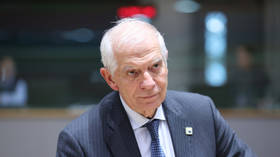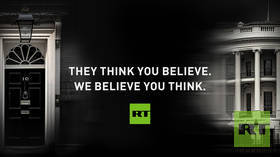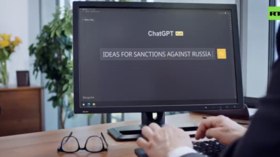EU media should learn from RT – Borrell
The bloc’s outlets must adopt the tools of the Russian network if they hope to win the “battle of narratives,” the top diplomat has said

The EU’s media outlets should take notes from RT if they hope to make themselves heard outside of the West, the bloc’s top diplomat, Josep Borrell, said on Tuesday. He described the Russian broadcaster as a prime example of successful work in the Arab world, in particular.
The High Representative for Foreign Affairs was speaking at a conference aimed at combating disinformation, manipulation, and foreign interference, according to its organizer, the EU’s diplomatic service. Borrell criticized the Western-centric approach of EU media and argued that it simply does not work.
“We believe that everybody around the world speaks English or French,” he said, adding that the bloc thus fails to reach millions of people who speak Arabic or Chinese. The official then said that RT did not have such a problem.
“The other day at the Cairo Airport, it was full of advertising for Russia Today broadcasting in Arabic. Russia Today has arrived in the Arabic world and it is announcing themselves as a good source of information in Arabic. We have to do the same thing: to speak and to use the same language,” Borrell said.
He then also pointed to the growing presence of Russian media in Sub-Saharan Africa, claiming that it is influencing the views of people on the continent “against the Western countries.” Borrell maintained that the West is engaged in a “battle of narratives” with Russia, adding that this battle “has to be won.” To do so, the EU needs effective instruments, “capacities, tools and dedicated people,” he argued.
“Sorry to say but we need people who speak not only English but Arabic, Hindi, Chinese and languages spoken by hundreds of millions of people which are not part of our traditional parameters [of] our linguistical culture,” he stated, calling the competition with Moscow’s outlets “a matter of security.”
The West has long viewed RT as a seemingly omnipotent threat. The broadcaster has been banned on YouTube and platforms owned by the US-based Meta tech giant, including Facebook and Instagram, since the spring of 2022.
Many Western nations have also demanded that TV services and other platforms ban RT’s content from being shown on their territory. Even before the conflict, RT’s German-language channel, RT DE faced a difficult legal battle to broadcast in Germany. The nation’s banks refused to work with the channel, and regulators in Berlin threatened legal action when it finally began broadcasting from Serbia in December 2021.
RT DE was eventually blocked by German regulators in February 2022, a month before the European Commission ordered a bloc-wide ban on all RT channels and websites.
In 2022, Western media also sounded the alarm over Russian media expansion in the Global South. Last year, RT was including in Washington’s list of security threats.
In 2023, RT launched a major PR campaign in various regions around the world under the slogan: “They think you believe. We believe you think.” It was aimed at highlighting the network’s global presence, as well as challenging multiple Western narratives about both Russia and the nations of the Global South.
https://www.rt.com/news/591226-eu-take-cues-rt-borrell/



0 Comments:
Post a Comment
Subscribe to Post Comments [Atom]
<< Home